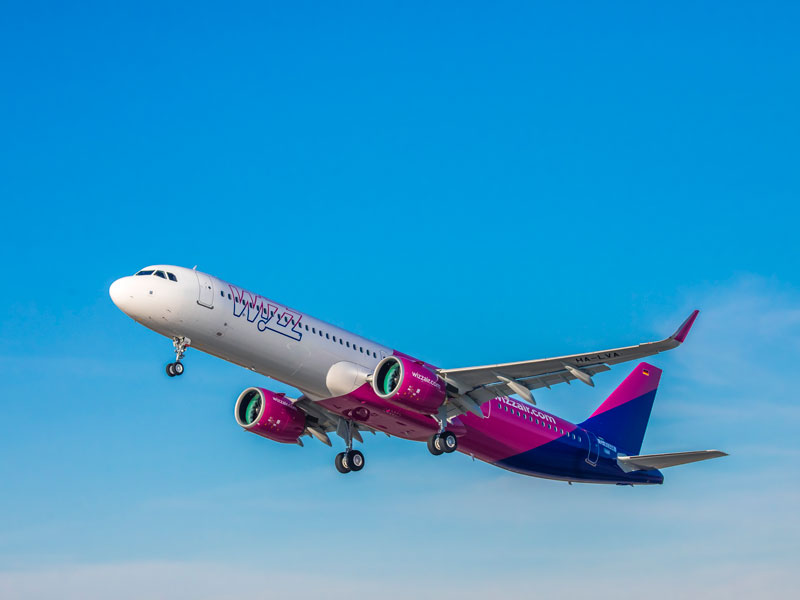
With COP28 just around the corner, sustainability is undoubtedly front of mind for most organisations. The aviation industry is making extensive efforts to address the current climate challenge, reduce its carbon footprint and create more sustainable air travel options.
But how can airlines realistically reduce their environmental footprint? While we know that a plane will never be more sustainable than a train or an electric vehicle, Wizz Air is on a mission to become a pioneer in sustainable aviation and has already delivered on a number of important milestones in terms of its sustainability strategy.
Pioneering sustainable aviation
Wizz Air proudly holds the title of the most sustainable low-cost airline according to the World Finance Sustainability Awards, with the lowest carbon emissions intensity in Europe, if not the world.
In the fiscal year 2023, we achieved an impressive 53.8 grams of CO2 per passenger per kilometre, marking an 11 percent reduction compared to the previous fiscal year. This achievement is the lowest emissions intensity ever reported by Wizz Air in a single fiscal year. We are not just setting records; we are setting industry standards and leading by example.
One of the key drivers behind our sustainability success is our commitment to continuous fleet renewal and focus on technology and innovation available here and now. The latest Airbus A321neo aircraft we operate is significantly more fuel-efficient than previous generation aircraft. Wizz Air boasts one of the youngest fleets globally, with an average age of four years, well below the average fleet age of its major competitors, which is around 10 years. Not only does this benefit our environmental efforts by reducing emissions intensity, but it also enhances the passenger experience with quieter and more comfortable flights.
We also believe that consumer sentiment is changing – passengers are choosing low-cost airlines over traditional network carriers, who are unable to meet the same efficiencies or achieve the same carbon emission reduction results. Switching to fly with Wizz Air can reduce a passenger’s CO2 emissions by almost 50 percent compared to flying with legacy carriers.
Future fuel
One of the cornerstones of Wizz Air’s sustainability strategy is the integration of sustainable aviation fuel (SAF). While we are working with Airbus on their zero-emissions hydrogen aircraft, which is 20–25 years away from now, we see SAF as a bridge between the present and a more sustainable aviation future, on top of fleet renewal and investments in operational efficiency. Although SAF holds immense potential to reduce carbon emissions by up to 80 percent over the fuel’s life cycle compared to using fossil jet fuel, we acknowledge the challenges it poses. Biofuels and e-fuels, while promising, have a limited supply, making them expensive and difficult to obtain.

Nevertheless, Wizz Air is actively addressing these challenges. We have forged partnerships and invested in SAF, both securing volumes for the mandates that are coming in 2025 in Europe and trying to help new technologies come to life.
We have four agreements in place with the world’s leading SAF producers, including Neste and OMV. We also made our first equity investment of £5m into Firefly, a UK-based biofuel company developing the technology to produce SAF from sewage sludge, and participated in a $50m investment in CleanJoule, a US-based company making biofuel from renewable agricultural residues and other waste biomass. These strategic alliances will not only help us secure a stable supply of SAF, but also drive innovation in this crucial area of sustainable aviation.
A brighter air travel outlook
There has been an upturn in passenger numbers following the challenges posed by the Covid-19 pandemic, the industry is recovering and people are flying again. It is clear, now more than ever, that the path to a more sustainable aviation industry involves investing in new technologies and embracing innovation. While Wizz Air has given the freedom to travel to more and more people, it has also proven that growth and sustainability can be achieved simultaneously.
By investing in the latest technologies, embracing SAF, and working collaboratively with partners, regulators, and stakeholders, we are leading the charge towards more sustainable air travel. We support legislative initiatives that mandate SAF use and encourage governments to invest in its production to ensure appropriate supply for the demand that is foreseen. In that regard, the European Union is a standard setter in terms of global climate policy, and we welcome such regulatory approaches.
With our holistic approach to sustainability and continued focus on resource efficiency, we are confident we can contribute to the communities we serve and the planet whilst also lowering our cost structure, strengthening the trust of our customers, and improving access to capital over the long run.


